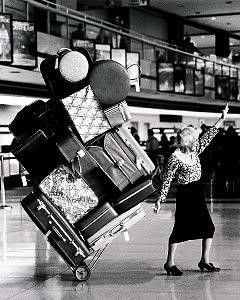It’s been a couple of weeks since 2016 began. New Year New You. How can the year or you be “new” if you’re dragging the past behind you? How can you create a new you when you are weighed down with the stuff you accumulated as the old you?
All of us accumulate stuff in our lives. Some of us even get to the point of accumulating so much stuff that we become hoarders. But it’s not just the physical stuff that clutters our lives. Take a look around. Where are you out of control? Is it your closet? Your appointment book? Your kitchen counter or desk top? Your possessions reflect who you are, who you are not and who you wish to be. Your possessions can become clutter if you aren’t careful. What is clutter? Clutter is anything that takes up space in your physical, emotional and mental world without making your life better. Clutter happens when you avoid decisions or refuse to make them.
You collect things for a number of reasons. You think you might need it later. You have a sentimental attachment to it. You spent money on it so you think you need to keep it. You hold on to things because you intend to use them. But it is likely that you made a mistake when you bought those things and it hurts you to come to terms with that and to let go. The unread book. The shoes that were never worn. The exercise equipment.
Clutter has more to do with how it feels than how it looks. For example, the clutter of a collection of teapots may make you feel happy because you enjoy looking at them or using them. The collection may bring fond memories of your travels when you purchased a teapot. But a clutter of unfinished projects may make you feel stressed or anxious. Your subconscious mind knows about all those unfinished projects and the clutter is a constant reminder of failure. If it doesn’t make you feel good, perhaps it’s time to let it go.
Clutter creates chaos in your environment. People who live in a state of chaos are prone to procrastination. They are anxious and overwhelmed and unable to take action. They are unable to commit to relationships or maintain a steady job. Researchers at the Princeton University Neuroscience Institute published the results of a study they conducted in 2011. These results show that when your environment is cluttered, the chaos affects your ability to concentrate and focus. Your brain’s ability to process information is limited. We cannot perform effectively when we are overstimulated. When you are surrounded by piles of unopened mail, overstuffed closets and crowded kitchen counters, the clutter competes for your attention in the same way a child pulling at you and repeating “mom” “mom” “mom” might do. The annoyance wears you down. The conclusions of the study show that if you want to perform to the best of your ability, you need to get rid of the clutter. The research shows that you will be more productive and able to process information better. So, why are you holding on to the clutter?
Peter Walsh, an organizational expert says, “Maybe it’s possible that the stuff we own and obsess over is the physical manifestation of the mental health issues that challenge our minds.” He divides clutter into two general types: “memory” clutter and “someday” clutter. Memory clutter is the stuff that reminds you of important events or people or achievements. It’s stuff like newspaper clippings and old photographs. Memory clutter may cause you to become depressed, as if you have nothing to look forward to and the best years are behind you. If looking at it bothers you, let it go. “Someday” clutter refers to things you feel you might need someday in anticipation of an imagined future. They can be things that are an aspiration to do or be something you are not. These things can create anxiety and trigger a lack of trust in the future. Make a realistic assessment of your need to hold on “just in case” and then make the decision based on your vision of the life you want to live. Someday clutter can extend to setting boundaries with other people as well. Are you storing piles of other people’s stuff? In case they need it someday? Set limits. “It’s about balance,” Walsh says of clutter control. “If you have so much stuff it drags you into the past or pulls you into the future, you can’t live in the present.”
I invite you to begin the New Year without dragging the past behind you. Ask yourself, “Who is going to get stuck sorting this mess out when I’m dead?” or “Will it fit into my coffin?” Do Not get containers to organize it all! It’s only more clutter! Do what is obvious – eliminate the excess. Giving away belongings benefits others. When you come across something you cannot part with, consider its purpose in your life and you may find that it has already fulfilled its role. Acknowledge the contribution and let it go with gratitude. If it’s really important to remember, take a photo to preserve the memory. Letting go helps you to rewrite the story of who you are and how you live right now. When you create empty space, you make room for new things and new experiences.
Organizing is about selecting the best and letting go of the not-so-good. Life is like this. There’s a lot of stuff that doesn’t matter. Outdated stuff. Broken stuff. Stuff that doesn’t fit any more. Focus on the stuff that matters. Your stuff tells the story of who you are.

